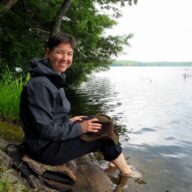- 1 – So many options
- 2 – Deciding to decide
- 3 – Opting out of choosing
- 4 – Making a change
- 5 – Staying in your field
- 6 – Choosing what helps
- 7 – Factoring in others
- 8 – Considering finances
- 9 – Expanding horizons
- 10 – Affording this choice
- 11 – Wanting only one
- 12 – Needing to work
- 13 – Going somewhere unexpected
- 14 – What’s the decision you need to make?
- Here are some tips to get you started:
- Reflection questions:
- More on decision-making
Sometimes I wish someone would make decisions for me.
I’m indecisive (I think). I get stuck on a hamster wheel in my head, spinning my options until I’m dizzy with decision fatigue. And despite my deliberations, too often I end up with a sense of regret.
So I’ve had to learn strategies to help me move forward in life, especially when it comes time to make significant moves.
One strategy is to break big decisions into many yes or no questions. To allow for little steps forward, even when I don’t have all the answers.
Each small question becomes an opportunity to interact with God, to ask him for help determining this particular yes or no. It’s kind of like praying for daily bread—you don’t get the whole thing at once.
To help explain this process, below is a choose-your-own-adventure story. Instead of reading the rest of this article from top to bottom, follow the instructions at the end of each section.
Once you’ve explored this example of decision-making, explore a decision in your own life with yes or no questions. There are some tips and questions at the bottom to help you get started.
Let the adventure begin! Imagine yourself in this recent grad’s shoes . . .
1 – So many options
You just graduated with a Bachelor of Science in Zoology from the University of Guelph. Congrats!
Not only that, but you’ve been accepted to three different Masters programs:
- Oceans and Fisheries at UBC in Vancouver
- Marine Management at Dalhousie in Halifax
- Masters of Divinity at Tyndale Seminary in Toronto
The last one would be a complete career change, but hey, it’s on the table.
The problem is, you don’t know what you want to do. You don’t know what God wants you to do. None of them are outrightly bad or immoral.
“If only it was a simple yes or no question,” you complain to a mentor. “This decision feels too complicated.”
“Actually what you have here is a whole pile of smaller questions,” she responds. “Let’s try to unearth the small, specific questions, and then answer them one at a time.”
“That’s so tedious,” you complain.
“It’s less tedious than being overwhelmed.”
Fair point. If you are willing to work through this process, go to 2. If you’d rather just roll a dice, go to 3.
2 – Deciding to decide
Choosing to make a decision is part of deciding. So you’ve already taken your first step!
As you stare at your three options, it’s clear that one would especially change the direction of your life: going to Tyndale would set you up to be a pastor, not a scientist.
Do you want a career change? If yes, go to 4; if no, go to 5.
3 – Opting out of choosing
Choosing not to decide is still a decision. In fact, you’re trusting Proverbs 16:33 to be true:
“The lot is cast in the lap, but every decision is from the Lord.”
So you literally roll a dice. And the winner is Dal! Start packing your bags!
To randomly choose is not necessarily wrong. But it may bypass an excellent opportunity to know God and yourself better through the process. So if you’ve changed your mind and want to do some decision-making, go back to 2.
If not, know that God goes with you on your next adventure.
4 – Making a change
Great! You’ve realized that you do not want to stay in biology.
Your answer seems obvious—except that, in a conversation with an actual pastor, you realize that maybe being in vocational ministry isn’t the only alternative to the sciences.
Do you want to pursue a career in ministry? If yes, go to 6. If you’d actually like to explore other options, go to 7.
5 – Staying in your field
You’re sticking with the sciences, cool. That seems to rule out Tyndale.
Now to decide between UBC and Dalhousie. Each option has different strengths and weaknesses. There are going to be lots of small yes and no questions that will need to be answered as you compare programs and cities:
- Do I want or need to do a thesis?
- Is it important to gain practical experience during my studies?
- Do I care about the Canadian or international rankings of my school?
- Can I afford the cost of tuition and living at each school?
- Do I want to live and develop relationships on the west coast? On the east coast?
When comparing similar opportunities, it’s okay to come up with a list of yes and no questions to answer concurrently—and slowly—as you gather information and reflect.
Clarity may not come from a particular answer but from taking your answers on the whole. Or you may realize that there are one or two questions that serve as deal-breakers.
Either way, writing out specific questions and answers can help you keep track of your decision-making process over time.
For now, if you want more examples of working through individual questions, start again at 4. If you want to head straight to some practical tips and reflection questions, go to 14.
6 – Choosing what helps
Ministry it is! But will studying towards a Masters of Divinity actually help you serve the way God might be asking you to?
If yes, go to 8. If no, go to 9.
7 – Factoring in others
So you’d like to get out of the sciences, but not by going into ministry. That’s an important realization!
Because you’ll be saying no to all three programs, your options have completely opened up again. Fortunately it’s still possible to look for smaller yes or no questions.
For example, your best friend will be moving to Quebec soon. You could ask questions related to going with them. And your grandpa is in need of extra care these days. You could ask questions about how you can help.
Whatever your next steps, it’s always a good idea to consider who else will be impacted by your decisions. Don’t be an island!
8 – Considering finances
It seems like an MDiv is the way to go. Great!
As you reflect, you realize that you especially value getting through school without debt. And Tyndale, as a private school, is expensive. Uh-oh.
Will you be able to afford going here right now? If so, go to 10. If not, go to 11
9 – Expanding horizons
You’ve realized that at least right now, you want hands-on experience, not more formal education. So, to your surprise, you’ll be saying no to all three Masters programs. Hopefully this expanded horizon excites, rather than overwhelms.
It’s probably a good idea to continue asking yes or no questions to decide on the right hands-on opportunity. For example, if you were part of a P2C-Student group, was it a meaningful experience? If yes, maybe you can consider interning with us (shameless plug).
Whatever you do, we hope you work at it with all your heart.
10 – Affording this choice
Through loans, scholarships, and a part time job, you can pay for your education! That makes the decision easy for you. Enjoy Tyndale!
11 – Wanting only one
Not having funding now doesn’t mean you can’t go to school again later—or elsewhere.
Is your heart set? Then go to 12. If you’re open to considering other schools, go to 13.
12 – Needing to work
Looks like you’ll have to work for a while to save for your education. Finding a job could be a whole other decision-making process, but for now, well done! You’ve discerned, knowing God and yourself better through the process.
Enjoy whatever work God ends up providing for you!
13 – Going somewhere unexpected
After some exploring, you realize that Wycliffe College at the University of Toronto fits your budget. Though it’s not in your denominational tradition, it has some great professors.
To your surprise, you’ll be starting an MDiv at Wycliffe this fall. Congrats!
14 – What’s the decision you need to make?
Whether you’ve just finished undergrad yourself, or have some other decision(s) to make, why not give this strategy a try?
Here are some tips to get you started:
- Write your questions down. Keep an active list of all the little questions under your big question.
- Create an order: some yes/no questions matter more than others.
- Answer them out of order. It’s okay to jump ahead and give a yes or no where it’s easier.
- Record your rationales, along with your yes and no, plus a date. These notes help if you need to look back later.
Reflection questions:
- What is the scope of your decision? How much are you trying to decide right now? (Hint: it’s not your whole life.)
- Who can help you talk through your specific smaller questions?
- When you don’t know whether something is a yes or no, what missing information might help you decide one way or another?
- How do you best connect with God? How can you bring these questions into those moments? (e.g. while you are on a walk in nature, in meditative silence, while serving someone else.)
Hopefully using yes and no questions will help you decide between the good options God has placed in your life.
More on decision-making
Determine God’s call with this guide to emotion-free decision-making
"*" indicates required fields
Share this!
About the Author




